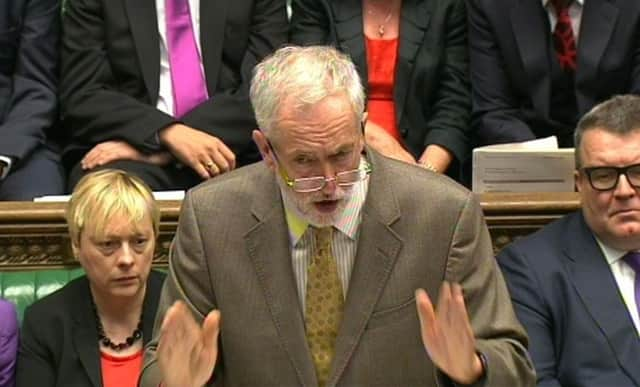Leaders: Corbyn’s PMQ priority is to challenge


Beginning with a query from “Marie” about the UK’s lack of affordable housing, Jeremy Corbyn signalled his intention to reconnect the Commons with the electorate, many of whom are said to be left cold by this weekly cacophony which often descends into caricature.
While the idea was a fine one in theory, in reality it fell flat, allowing the Prime Minister to answer as if appearing on a radio phone-in.
Advertisement
Hide AdAdvertisement
Hide AdAnd the idea wasn’t particularly novel either – David Cameron began his career as opposition leader in 2005 by promising an end to “Punch and Judy” politics.
Like it or not, PMQs plays an important part in our parliamentary democracy; it provides a regular forum in which the Prime Minister can be held to account. More importantly for Mr Cameron’s opponents, it provides a chance to land a telling blow – something Ed Miliband repeatedly failed to do.
Mr Corbyn told the Commons he had received 40,000 responses from members of the public after sending out an e-mail seeking ideas for issues which could be raised at his first PMQs.
He followed up his first question with one from “Paul” about cuts to tax credits and a third – this time on cuts to mental health services – from “Gail”.
The unusual format led to an unusually hushed House of Commons as MPs, perhaps conscious of not falling into the trap of being denounced as “theatrical” by Mr Corbyn, sat in uneasy silence.
It was only when the SNP’s Westminster leader, Angus Robertson, clashed with Mr Cameron over his alleged failure to honour assurances given in the run-up to last year’s independence referendum that normal service was resumed. In what has been a shaky start for the new Labour leader, he was entitled to be suffering from nerves ahead of his dispatch box debut. If that was the case, he didn’t show it. His performance was sincere and assured.
But while he is to be applauded for his attempts at a new approach to PMQs, he will have to think again.
The results of May’s general election and indeed Mr Corbyn’s own election as Labour party leader confirms there is an appetite for change and a move away from the jeering and heckling of old.
Advertisement
Hide AdAdvertisement
Hide AdThese next few weeks are likely to provide a steep learning curve for a man more accustomed to the back benches than frontline politics.
However, if he is to make a success of the mandate he has been handed then he must realise that making PMQs less adversarial benefits not him, but the man he faces across the dispatch box.
Managing release is a positive step
Releasing prisoners days before they have completed their sentence may seem like an idea unlikely to have a dramatic impact on the crime rate.
But legislation introduced by the Scottish Government will provide for just that, and the argument for it is sound.
According to penal experts, releasing prisoners on a Friday or at the weekend can instantly put them at risk of re-offending.
The argument is that those inmates released over the weekend struggle to access help with everything from accommodation to dealing with addiction. Those first few days acclimatising to the world outside a prison cell can be the most difficult and the most dangerous.
An initial failure to find help for a range of problems can lead back to drugs, alcohol or whatever caused the offending in the first place.
Between 9,000 and 10,000 people serving short-term sentences leave custody every year and this group accounts for the highest number of people who go on to re-offend.
Advertisement
Hide AdAdvertisement
Hide AdUnder the Community Justice (Scotland) Bill, there will be an increased flexibility allowed for when those people are released.
The government has also outlined a number of other changes including improvements to drug and alcohol services for those in prison and those recently released.
Justice secretary Michael Matheson said offenders need to be supported to become “active and responsible members of society”.
Making sure all the support we can offer is in place for when a person leaves prison helps to achieve that goal. Doing so benefits us all.